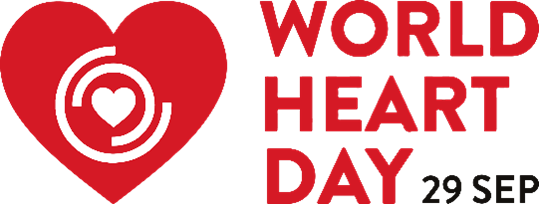
World Heart Day is a reminder to everyone around the world to take care of their heart. On 29th September of every year, we draw everyone’s attention to heart illness and related health issues.
Did you know that your heart is the size of your fist and the strongest muscle in your body? It started beating about three weeks after you were conceived. If you live to be 70, it will have beaten two and a half billion times.
Although impressive and strong, your heart can also become weak due to smoking, diabetes, cholesterol, eating an unhealthy diet, or living with high blood pressure. The system can also be damaged from previous heart conditions.
If the heart becomes unwell, this is known as cardiovascular disease (CVD). CVD covers any issues with the system that has the heart at its centre. These illnesses affect the heart or blood vessels (veins and arteries).
CVD is the world’s number one killer, causing over 20.5 million deaths per year. Of these deaths, 85% are due to coronary heart diseases (e.g. heart attacks) and cerebrovascular diseases (e.g. strokes).
We want to bring this number down – way down. And there’s hope: 80% of these deaths are preventable – that is over 15 million lives. By making changes to our lifestyle – what we eat and drink, how much we exercise, and how we manage stress – we can better manage our heart health and beat CVD.
World Heart Day is a reminder to everyone around the world to take care of their hearts. This year’s campaign focuses on knowing our hearts first.
Dr Titilopemi Oladosu, Specialty Advisor Hypertension and Cardiovascular disease, NHS Norfolk and Waveney ICB said:
“World Heart Day is a great reminder that we can all act to look after our heart. Little actions can make a big difference, while simple changes can be made to reduce the impact of diabetes, cholesterol, excess weight, and high blood pressure. It’s not too late to show your heart some love.”
Preventing CVD
A healthy lifestyle can lower your risk of CVD. If you already have CVD, staying as healthy as possible can reduce the chances of it getting worse.
USE ❤️ TO SAY NO TO TOBACCO
- It’s the single best thing you can do to improve your heart health . Exposure to second hand smoke is also a cause of heart disease for non-smokers.
- NHS Better Health website can provide information, and Ready to Change, practical advice to help.
- Find out about local support that is available at Smokefree Norfolk OR Feel Good Suffolk. Your GP or local pharmacy can also provide you with advice and support.
Read more about stopping smoking, the NHS Better Health website can provide information, and Ready to Change, practical advice to help.
USE ❤️ TO EAT WELL
A healthy, balanced diet is recommended for a healthy heart including:
- low levels of saturated fat – try to include healthier sources of fat, such as oily fish, nuts and seeds, and olive oil, and avoid unhealthy fats such as fatty cuts of meat, lard, cream, cakes and biscuits,
- low levels of salt – aim for less than 6g (0.2oz or 1 teaspoon) a day low levels of sugar,
- plenty of fibre and wholegrain foods,
- plenty of fruit and vegetables – eat at least 5 portions of fruit and vegetables a day,
Read more about healthy eating, and Ready to Change, practical advice to help.
USE ❤️ TO GET MORE ACTIVE
- Adults should spend at least 2 and a half hours a week doing moderate activity (so you can talk but cannot sing your favourite song), such as cycling or brisk walking.
- If you find it difficult to do this, start at a level you feel comfortable with and gradually increase the time and strength of your activity as your fitness improves.
Read advice about starting exercise, the NHS Better Health website can provide information, and Ready to Change, practical advice to help.
USE ❤️ TO MAINTAIN A HEALTHY WEIGHT
- If carry excess weight, regular physical activity and a healthy diet can help you achieve a healthy weight.
- If you’re struggling to lose weight, your GP or practice nurse can help you come up with a weight loss plan and recommend services in your area.
Read more about losing weight, the NHS Better Health website can provide information, and Ready to Change, practical advice to help.
USE ❤️ TO CUT DOWN ON ALCOHOL
- If you drink alcohol, try not to exceed the recommended limit of 14 alcohol units a week for men and women.
- If you do drink this much, you should aim to spread your drinking over 3 days or more.
- A unit of alcohol is roughly equivalent to half a pint of normal-strength lager or a single measure (25ml) of spirits. A small glass of wine (125ml) is about 1.5 units.
- Your GP can give you help and advice if you’re finding it difficult to cut down your drinking.
Read more about cutting down alcohol, the NHS Better Health website can provide information, and Ready to Change, practical advice to help.
For more information visit https://www.nhs.uk/conditions/cardiovascular-disease/ or if you have any concerns please visit your GP practice.
ENDS
